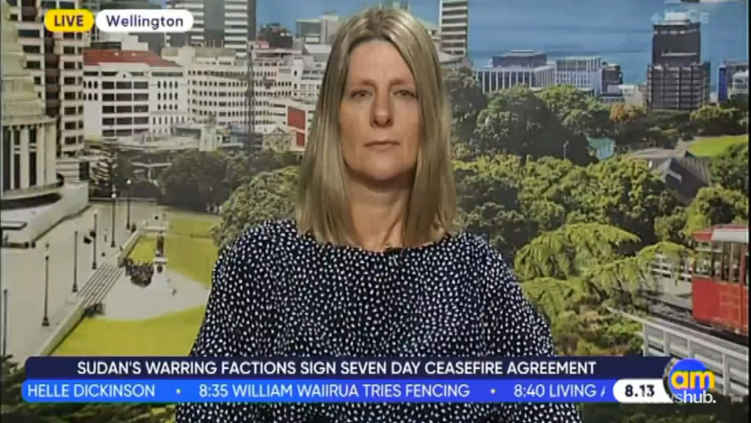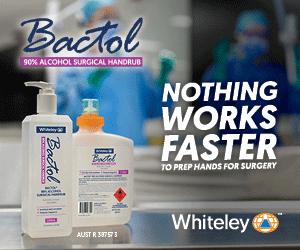
 |
Naomi WaipouriThe registered nurse (RN), Te Poari representative for Greater Wellington and bachelor of nursing Māori kaiako (tutor) became politically aware after a bad placement experience. Actualising te Tiriti: Supporting change within workplaces to actualise te Tiriti is an important political action that all nurses can take. Being politically aware: Keeping up to date with health and industrial issues provides a strong foundation for political advocacy. Being open to change: A challenging experience made Waipouri realise the importance of being able to advocate for herself and others.
|
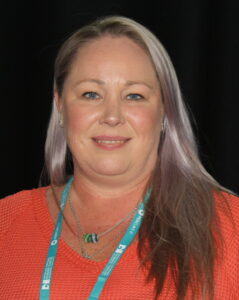 |
Natalie SeymourAged residential care hospital service manager, RN and college of gerontology chair Natalie Seymour became politically active when COVID-19 put the aged care workforce under unprecedented pressure. Speaking to media: People need to understand the challenges members are facing and speaking to media is a way to increase awareness, and achieve change. Don’t become complacent: Having “hard” data to support anecdotes is an important tool to reinforce the extent of the problem for those outside the health sector. Multiple options for action: Taking action to advocate for change isn’t only about standing on a picket line. There are many other ways to contribute to collective action. |
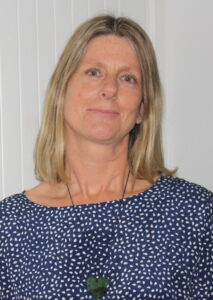 |
Christine WarranderGisborne Hospital RN and delegate of four years, Christine Warrander led her ward on a one-hour strike over health and safety concerns. Determination: Be persistent to raise unsafe staffing. Channel deep frustration and concern for patients and colleagues into consistent action. Support from NZNO: Work closely with organisers, and seek advice about what action is legally possible. Giving members a voice: Industrial action such as a strike is a platform to convey how serious the situation is, and this can be amplified by the media. |
When she became an NZNO delegate, Christine Warrander would never have believed four years later she would be leading her ward to a strike and speaking regularly to national media – but she has no regrets.
“Walking out and seeing the amount of people lining the hallway, that have got our backs, it was like . . . mind-blowing, it was something we were definitely not expecting.”
Warrander said members were still waiting to see if management would make the changes asked for – a reduction of beds from 25 to 20 – but remained determined.
“I think the amount of support we got is going to make management think we do have to do something . . . and if things don’t change we’re prepared to do it again.”
Political focus for Maranga Mai!
The action Warrander and her ward-five members took is a fulfilment of Tōpūtanga Tapuhi Kaitiaki o Aotearoa – NZNO’s Maranga Mai! strategy for political action, where “delegates and members are supported to become politically aware and active”.
Maranga Mai’s political actions include:
- Te Tiriri o Waitangi leads all aspects of discussion and decision-making.
- NZNO is front and centre of all health discussions with government.
- NZNO will engage in high-level proactive politicisation of identified issues.
- NZNO delegates and members are supported to become politically aware and active.
- NZNO will challenge and promote change to immigration barriers experienced by Internationally Qualified Nurses (IQNs).
- MPs and local government targeted.
- Iwi leaders engaged and supportive.
Why do we need to be politically engaged and active?
NZNO kaiwhakahaere Kerri Nuku says being political doesn’t mean taking sides with political parties, but standing up for changes needed in the health system.
“Being a nurse is political, because how else are you going to advocate for the best care for your patients?
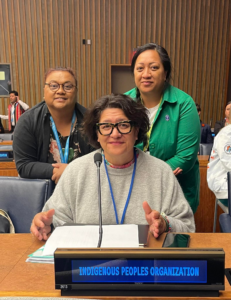
NZNO president Anne Daniels agreed, and said Nursing Council competencies required advocacy for patients ” . . . and that does not mean just that patient in front of you, it means all patients”.
Both leaders agreed there has been a shift in the culture among nursing and health-care workers, who are more willing to voice their concerns and distress about their working environments.
NZNO has become better at protecting and supporting members to have a voice, than in the past, Nuku said.
“In the past, we’ve not necessarily protected members when they’ve gone out and spoken, and what I can do is reassure them that there are processes being built to support member voices, because that’s really critical for the person at the coalface, or on the frontline.”
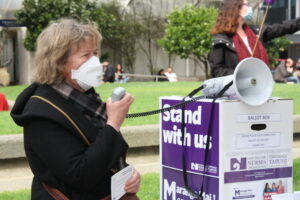
Daniels said members’ fears about speaking up about their concerns, were often stoked by employers.
” . . . employers have lied to them, they have said you cannot speak to the media.”
Under the Employment Relations Act, schedule 1B, section 14-18, employees are entitled to “comment publicly and engage in public debate on matters within their expertise and experience as employees”, as long as they have first raised the issue with their employer.
If the employer’s response is unsatisfactory, an employee can speak publicly as long as they make it clear they are speaking in a personal capacity, or on behalf of a union, and don’t breach patient confidentiality.
“I would love to see in the future, an organisation that is full of people who don’t run, when they are asked to stand up and talk to the media, but volunteer to do so,” Daniels said.
The role of te Tiriti
A significant part of the political focus for NZNO is about being led by principles of te Tiriti o Waitangi, including tino rangatiratanga – self-determination.
“For me, the heart and soul of what makes Aotearoa unique is its commitment to te Tiriti, as tangata whenua, so that has to run across every single priority we have,” Nuku said.
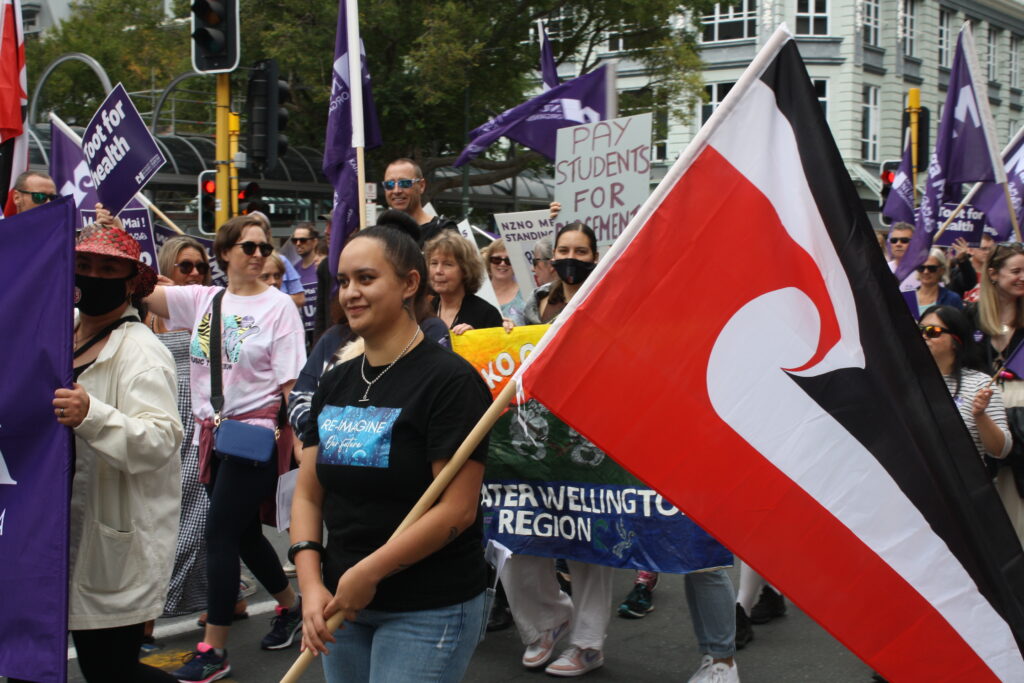
Nuku said this meant ensuring te rūnanga, and its governing body, Te Poari are actively involved in decisions of the organisation.
“In the past, te Tiriti stuff was compartmentalised to only Māori, and only sitting out to the side, which means that unless you consciously turn your head to it, it’s ignored.”
‘Little voices can be heard’
For Warrander, finding herself leading a strike was unexpected, but empowering.
She became the face of the strike action for national media and was also involved in NZNO’s legal fight for the right of the Gisborne Hospital members to take the action, after their employer, Te Whatu Ora, took the matter to court.
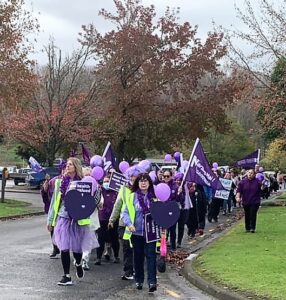
Warrander encouraged others to speak up and follow through on action to achieve better, safer conditions for staff and patients.
“Little voices can be heard, and there is strength in numbers, so there’s no point sitting back moaning that things are not right, you kind of need to take some action on it.
” . . . we’re a small hospital and for Gisborne to achieve something that has never been done before is a massive win for us, and if we can do it there’s no reason why other places can’t do it as well.”
She said the support of NZNO staff, providing advice on what was legally possible, gave her and the ward five members confidence to follow through with the action.
The snowball effect of political action
Warrander said the recent action by members marked a shift in attitude. In the past, members had been more reluctant to take action, afraid it would affect their careers negatively.
Warrander said she and her colleagues were emboldened to “go the whole hog”, after many attempts to get safety issues addressed, including issuing of a provisional improvement notice (PIN), had made no difference to management of the ward.
When a decision was made to put in a strike notice, Warrander was already committed to follow through on the process.
“I joked on the ward, ‘oh well, the mark on my back is already there, I may as well just make it bigger, make it a proper target, not just a small one’.”
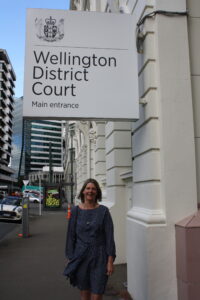
Te Whatu Ora’s attempt to stop the strike through legal action, its denial of the safety issues, and the resulting impact on employees only served to strengthen Warrander’s resolve, she said.
“I just thought, there’s no holds barred now, I’m done on it. To me it just seemed like a total lack of awareness of what we were going through, and it just seemed disrespectful.”
Warrander said she was incredibly buoyed by the strength of support from members across the country, and other parts of the hospital.
“It’s been amazing, and the staff are still talking about it. It gave us a bit of a morale booster to know the support is out there, because we know there’s short staff everywhere but we felt like we were . . . struggling on our own.”
Elections – key opportunity to flex political muscle
NZNO campaigns director Tali Williams said the act of joining a union was itself a political move, but fixing a broken health system would require more.
The 2023 general election presented a powerful opportunity, Williams said.
“We need to use the opportunity of the election to put pressure on the current government to agree to our fixes, and further, to make it clear to any incoming government the expectations of nurses.”
In April, NZNO launched a national petition asking political parties to commit to key “fixes” for the health system. A lobbying campaign is underway through June and July, with members taking their experiences and solutions to their local MPs.
“[MPs] are going to listen much more to members than they will to one or two union leaders, because what they are looking for is which way voters are going to go, and nurses are voters, and nurses have families who are voters,” Williams said.
Turning disempowerment into empowerment
Te Poari member and RN Naomi Waipouri (Ngāpuhi), 25, says a bad student placement experience catapulted her into an advocacy role as a young Māori student.
While Waipouri and another Māori student were on a placement, some staff there made derogatory comments about Māori patients, and the attitudes made the students feel disrespected and unsafe, Waipouri said.
The students stopped attending the placement and were then threatened with expulsion from the course by their education provider.
Waipouri sought help from NZNO’s national student unit, and kaiwhakahaere Kerri Nuku became involved, advocating for them to continue their studies, which they did.
The experience and support she received motivated Waipouri to learn more about how to advocate for herself and others, and led her to become a regional representative on te Rūnanga Tauira, and later, a member of Te Pōari.
“I didn’t want any other student nurses to go through that.”
Waipouri now splits her work time between supporting Māori nursing students at her former educational institute and working in the Hutt Hospital burns unit.
But she has continued to be politically active.
Just in the last week, Waipouri attended multiple political meetings including those held by the Labour Party, the National Party and the Council of Trade Unions.
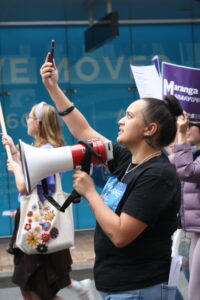
On Wednesday, she and attended a rally calling on the Government to pause work on its Therapeutic Products Bill. Some health advocates, including Waipouri, oppose the inclusion of rongoā Māori in the proposed bill because tangata whenua could lose control over where and how it is used. There are also concerns about how it will affect access to unfunded medications.
For Waipouri, keeping up to date with political issues was an important foundation for advocacy and action.
“[It’s] trying to be updated with everything that’s going on around you, being involved in meetings, whether they are NZNO ones, Te Whatu Ora, or political party election meetings, just so you can have a bit more of an idea about what is going on in your area, while also being able to question and challenge some of the things.”
‘I could not have cared less previously. There was always someone else out there fighting the good fight.’
Having a presence at the political meetings was about letting politicians know what nurses needed, to “help shape policies that will have a real impact on people’s lives”.
But advocacy could also take place while on the job, Waipouri said.
Discriminatory attitudes were still “alive” in some placements. Supporting efforts towards individual and workplace cultural competency was an important political action that all nurses could take, Waipouri said.
“I’ve seen tick box systems . . . but I haven’t seen true understanding, and it’s like that comes with the nature of nursing and the busy environments, but we all need to make an effort here.”
The trigger for political action: a pandemic-fuelled staffing crisis
In late March 2020, the country went into lockdown, with the threat of a global pandemic shouldered by essential workers – including those at the coalface in health care.
Aged residential care (ARC) hospital service manager, RN and college of gerontology chair Natalie Seymour says her rise to action came from a call from NZNO communications manager Rob Zorn. Could she talk to a journalist about the impact of COVID-19 on the aged-care sector?
Seymour, 43, decided it was time for her to speak up.
The pandemic brought an already strained and exhausted workforce in the aged residential care sector to crisis levels and media interviews gave Seymour a chance to provide a reality check on what was happening, she said.
Seymour said the experience was daunting, but she was highly motivated to convey the distress of staff and concerns for patients. She felt well supported by NZNO and had gained experience through talking to Kaitiaki.
‘I didn’t want any other student nurses to go through that.’
“It was not about telling stories that holes could be poked into but speaking from first-hand experience and from colleagues’ perspectives,” Seymour said.
From one interview, the requests flowed, with Seymour speaking to multiple journalists over the following months.
In 2021, she was invited to share her experiences of short-staffing as part of a submission to a parliamentary health select committee calling for mandatory staff-patient ratios for aged residential care.
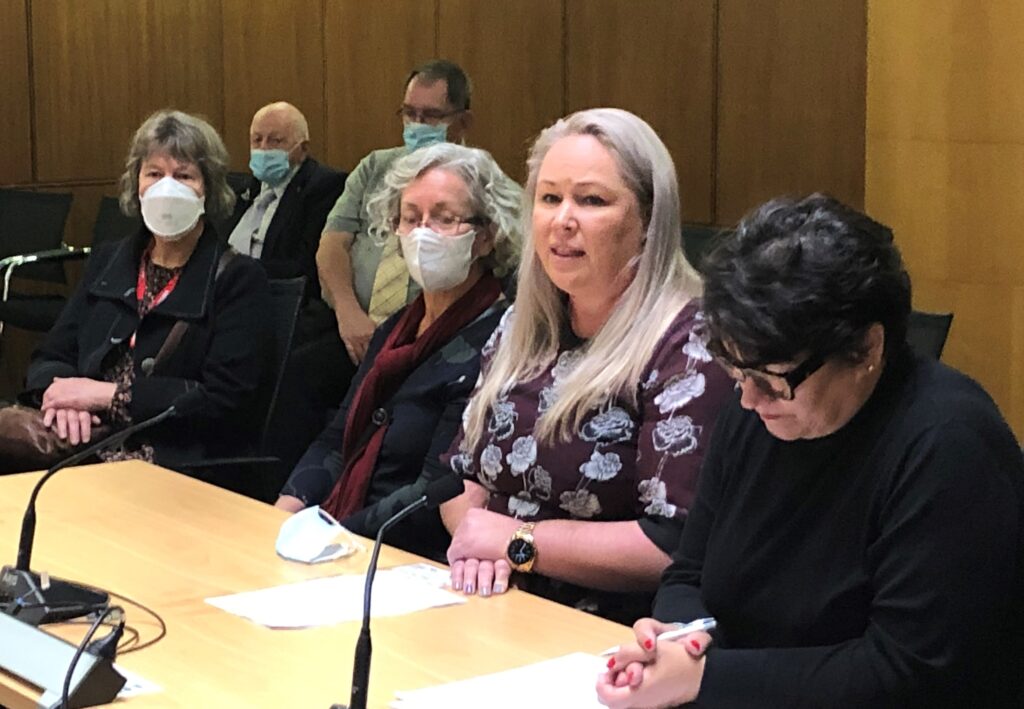
Before the pandemic, Seymour says she was not at all interested in speaking up about issues in her workplace.
“I could not have cared less previously. There was always someone else out there fighting the good fight.”
There was also fear of being perceived as a “troublemaker”, but Seymour said she now felt people needed to hear about the struggles of nursing.
A nurse for 22 years, Seymour said nurses and health care workers were more willing to talk about their experiences – a reflection of the deep frustration and anger they felt about conditions faced on a daily basis.
“I think nurses, in general, are just fed up and because of that they are no longer afraid to voice that.”
However, the appetite for political action varied among members, for different reasons, and Seymour said she respected those choices.
‘Walking out and seeing the amount of people lining the hallway, that have got our backs, it was like . . . mind-blowing, it was something we were definitely not expecting.’
For those still reluctant to take action, Seymour said there were many ways to be political.
“It could be you just have those quiet discussions with your peers and colleagues, or you just support the rest of us who aren’t afraid to be the voice or the face of whatever it is we are trying to raise,” Seymour said.


